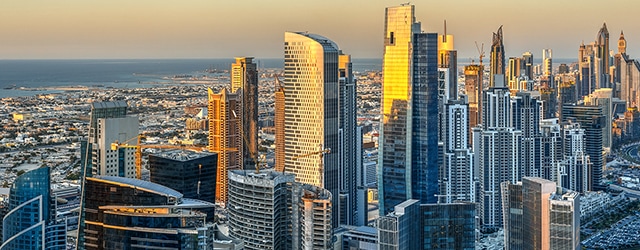Already facing low oil prices and weak credit demand, Middle Eastern banks now must gird themselves for the impact of Covid-19.

The coronavirus crisis has hit fossil fuel demand with the force of an approximately 100-ton weight. The resulting oversupply has pushed oil prices down to levels that could lead to wrenching fiscal austerity in most countries in this economically and politically fragile part of the world.
The Middle East is likely to suffer its “worst downturn since the 1980s,” writes Jason Tuvey, senior emerging markets economist at Capital Economics, in his March 25 blog post. “We now expect the region as a whole to contract by around 1.7% this year,” he notes. “For the Gulf countries at least, the hit will be partially mitigated by stronger growth in hydrocarbon sectors.”
Production in Saudi Arabia, the United Arab Emirates and Kuwait would remain profitable even if oil fell to as low as $15 a barrel, Capital Economics calculates. However, the important tourist and retail sectors will be hit hard. The non-oil sector will weaken and delinquencies on loans could rise, Tuvey predicts.
The Central Bank of the United Arab Emirates has recommended that commercial banks implement measures to counter the effects of the coronavirus, including rescheduling loans, offering deferrals on monthly loan payments and reducing fees and commissions.
Arab Bank enters this difficult cycle repeating as Global Finance’s Best Bank in the Middle East, based on its deep knowledge of the region, prudent approach to banking and well-diversified income streams. It also takes the country awards for Jordan and Yemen. Arab Bank reported earnings rising 3.2% to $846.5 million in 2019, while maintaining the quality of its credit portfolio with loan-loss provisions exceeding 100%.
“We are honored to receive such a valuable recognition from Global Finance for the fifth consecutive year,” says CEO Nemeh Sabbagh. “Arab Bank enjoys a distinctive presence across the MENA [Middle East and North Africa] region. We are deeply rooted in almost all the Arab countries, where we operate as a local bank as opposed to a branch of a foreign bank.”
With a network of more than 600 branches, Arab Bank obtains more than 70% of its income from outside its home market of Jordan. It is a leader in financing infrastructure projects across the region with a focus on renewable energy, including solar projects in Jordan.
Arab Bank’s “ability to achieve solid results year-on-year represents its unique capacity to operate under challenging circumstances in most countries across the region and still deliver consistent performance while serving its customers and protecting the interests of its depositors and shareholders,” Sabbagh says.
The coronavirus outbreak poses “an unprecedented challenge and a very serious threat at all levels and across all geographies,” he adds. “As a leading regional financial institution, we have activated our business continuity and crisis management plans and are deploying the resources and capabilities needed to protect our employees, our customers and the communities in which we operate. We are also working very closely with the various stakeholders to ensure that we contribute to and support the collective efforts needed to navigate safely through this severe global disruption and alleviate the burdens associated with it as much as possible.”
Saudi Arabia
Saudi British Bank (SABB) is our 2020 Best Bank in Saudi Arabia. SABB combined last June with Alawwal Bank to create the third-largest bank by assets in the kingdom. It provides corporate clients a full range of treasury, liquidity and cash-management solutions through a network of 171 branches in Saudi Arabia and has been a key digital trade innovator there. It also serves global clients across a network of 85 countries through its association with HSBC, which holds a noncontrolling interest in the bank.
“We are honored to be recognized as the best bank in the kingdom by one of the industry’s most respected commentators,” says David Dew, managing director of SABB. “The past 12 months have been an exceptional period in our history. Our merger with Alawwal Bank has meant a lot of work reviewing each business, to take the best of both into our final proposition. At the same time, I’m very proud that we’ve also led the industry with some key innovations during this time.”
SABB recently became the first bank to facilitate a blockchain trade in Saudi Arabia and Bahrain, Dew notes, “making it easier for our customers to tap into growth opportunities abroad. We also introduced Waafer, a new concept of savings offering higher returns without the usual minimal balance requirements. I’m also proud of our ongoing digital investment, resulting in a top-rated mobile application and a market-leading online platform.”
UAE
First Abu Dhabi Bank (FAB), our Best Bank in the United Arab Emirates, is the largest bank in the UAE by assets and market capitalization and was the safest bank in the region for 2019, as ranked by Global Finance. FAB was the leading bookrunner for syndicated loans in MENA last year and the only UAE-based bank chosen as a joint bookrunner in the record initial public offering of Saudi Aramco. It launched operations in Saudi Arabia last year by opening branches in Riyadh, Jeddah and Al Khobar.
“This award is a testament to the confidence that our customers and peers have in FAB,” says Andre Sayegh, group CEO, “and our vision to create value for all our stakeholders to grow stronger. Now, this commitment is more important than ever. We always strive to provide our customers with market-leading solutions, and today that means adapting to their needs in a very different way and partnering with others to do so.”
Earnings rose 4% last year on a 16% increase in loans and a 12% rise in deposits. Recently, FAB signed an agreement with the Abu Dhabi government to extend state-backed loans to small and medium-size enterprises (SMEs) as part of an economic stimulus program.
At present and for the near-term future, the coronavirus crisis poses a new set of challenges. “We are proud to work in tandem with other UAE banks to provide added certainty to individuals and businesses across the nation during these unprecedented times,” Sayegh says. “The measures we have implemented provide our customers with meaningful support, including relief on repayments and suspension of fees across a wide range of our products and services. FAB also joined forces with Emirates Red Crescent to support front-line health professionals and previously partnered with the ministry of education to support their distance-learning platform. We are humbled to be part of these initiatives and hope that, by giving back, we can play our part in the global fight against Covid-19.”
Kuwait, Bahrain, Qatar, Oman, Iraq
National Bank of Kuwait (NBK) remains among the highest-rated banks in the region and is our choice for Best Bank in Kuwait. NBK’s earnings rose 8.2% last year to $1.32 billion, accounting for more than 43% of the banking industry’s profits in the emirate. Within the region, NBK continues to focus on growing its presence in key markets, notably Saudi Arabia and Egypt. It opened two new branches in Saudi Arabia in the last year, where its Al-Watani wealth management business is growing rapidly. In Egypt, NBK sees the retail banking market as an area of high potential growth.
Ahli United Bank (AUB) takes the title as Best Bank in Bahrain, posting a return on equity (ROE) last year of 17.7%, one of the highest in the region. It is now in process of being acquired by Kuwait Finance House. The merger would create the world’s largest Islamic bank, with assets of more than $100 billion.
AUB has both onshore and offshore operations in Bahrain. It employs a diversified business model, capturing cross-border flows from its operations in Kuwait, the UAE, Egypt, Iraq, Oman, Libya and the UK. Earnings rose 4.7% last year to a record $730.5 million.
“This award from Global Finance is a valued recognition of the sustained success of AUB’s integrated cross-border business model, robust risk management, intelligent cost/spend culture and highest standards of corporate governance,” says Adel El-Labban, group CEO and managing director. “It also reflects AUB’s ability to sustain core earnings momentum in the midst of a difficult operating environment exacerbated by the volatility in oil prices and more recently compounded by the Covid-19 pandemic and its economic ramifications.”
Noting that “AUB’s foremost priority has been to ensure the safety of its employees, customers and counterparties,” El-Labban says the bank “has activated its comprehensive remote business continuity plan to address the lockdown conditions of different intensities imposed in its markets and to provide uninterrupted service to its customers.”
Qatar National Bank (QNB) beat analysts’ forecasts with a 4% rise in earnings last year to $3.94 billion. QNB, which already had a presence in 31 countries, won approval last year to open its first branch in Hong Kong as it expands into Southeast Asia with representative offices in Myanmar and Vietnam. It holds a 95% stake in QNB Alahli, the second-largest private bank in Egypt, which posted a 32% increase in earnings last year to $433 million. Earnings at QNB Finansbank in Turkey slipped 4% to $504 million, but deposits rose 9%. In Qatar itself, QNB controls 45% of all loans and deposits and reports a 20.2% average (ROE).
Our winner in Oman, Bank Muscat, commands about 35% of the banking sector and is roughly the size of the next three banks combined. Bank Muscat has 162 branches, 20 of which operate under Islamic rules. Earnings rose 3.3% in 2019 despite a 0.7% decline in loans due to the prepayment of some large corporate loans. The bank established a sukuk program denominated in local currency for the government last year.
Trade Bank of Iraq, as its name suggests, focuses primarily on trade finance. Our winner in that country, it has 25 branches and is one of Iraq’s most profitable banks. Earnings last year rose 68% to $556 million. The bank made significant efforts to lift the Iraqi economy in 2019 through $1.9 billion in new loans. It also opened its first international branch, in Saudi Arabia, last year.
Egypt
Commercial International Bank (CIB) is our 2020 Best Bank in Egypt, based on its strong financials and client-centric business model, and the leading private sector bank in the country. It is also the preeminent corporate bank, offering a broad range of products and services. Earnings rose 23% last year and ROE was an impressive 29.5%. CIB last year became the first bank in Egypt to form a venture capital firm focused on financial services, providing it with flexibility to adapt to unforeseen changes in the market.
Ahead of the pandemic, “we have created a comprehensive suite of digital products to bring the bank to our customers’ fingertips,” says Hisham Ezz Al-Arab, chairman and managing director, “which proved to be critical tools during the required social distancing imposed to fight Covid-19. Customers can avoid public places by banking from the comfort of their homes with internet banking, our smartphone app, the CIB mobile wallet, phone banking and chatbot.”
The bank is focusing much of its attention during the crisis on its SME clients. CIB is “implementing central bank directives to extend maturities and interest on loans for six months, forgiving 50% of the principal on loans to nonperforming SME clients and fully forgiving interest where our exposure amounts to less than 10 million Egyptian pounds [about $635,000]. We recognize that this is a turbulent time for the global economy and we are extending full support to our clients by [arranging] rescheduling in affected industries and providing the finance needed for our clients to continue their operations.”
Israel, Palestine, Lebanon
Bank Hapoalim, Israel’s largest lender, posted an increase in core income last year; but headline earnings swung to a loss in the fourth quarter after it agreed to pay $870 million to settle a US tax-evasion probe. Dov Kotler, its new CEO, plans to move ahead with a push for new business activity and a continued focus on efficiency. Hapoalim’s credit portfolio rose 3.7% in 2019 while deposits were up 2.3%.
Bank of Palestine, with 74 branches across the West Bank and Gaza, is our choice for Best Bank in Palestine. With more than $5 billion of assets, it accounts for one-third of Palestine’s loans and deposits. Its subsidiary, Arab Islamic Bank, provides banking solutions to a growing segment of the population. Islamic banking accounts for only 10% in Palestine at present, but the potential market is estimated at closer to 25%.
BLOM Bank, our selection as Best Bank in Lebanon, is enduring a difficult period following last October’s political upheaval. Lebanese banks were forced to place limits on withdrawals and international transfers. To shore up bank capital, the Bank of Lebanon issued a directive that banks not distribute profits in 2019 and increase their capital 20% by June 2020.
“Despite two major shocks that have hit the Lebanese economy—the financial crisis of October 2019 and the coronavirus pandemic of this year—BLOM Bank has capitalized on its conservative model to navigate these crises with minimal damage to its balance sheet,” says Saad Azhari, chairman and general manager. While continuing to upgrade services, it has proceeded with a digital transformation and remains committed to a corporate social responsibility (CSR) agenda, Azhari adds.
“The bank has remained honest to its rich CSR roots, especially in relation to initiatives to confront the coronavirus pandemic,” he says. “For that purpose, the Association of Banks in Lebanon has donated $6 million as a first step toward that fight. That is in addition to the precautionary measures the bank has taken in its premises to ensure the safety of its staff and clients.”
BLOM Bank is also fortifying itself against the difficult period underway. It has undertaken to increase its capital and allocate all of its profits in Lebanon to provisions. The result is that the bank remains well capitalized, adequately liquid and with good asset quality as its exposure to Lebanese sovereign eurobonds is limited to less than $200 million. As of June 2019, the last time Lebanon’s banks released results, BLOM Bank was the only major institution to report an increase in deposits. It also reported the lowest fall in profits, at just over 2%.
Middle East Winners |
|
|---|---|
| Bahrain | Ahli United Bank |
| Egypt | Commercial International Bank |
| Iraq | Trade Bank of Iraq |
| Israel | Bank Hapoalim |
| Jordan | Arab Bank |
| Kuwait | National Bank of Kuwait |
| Lebanon | BLOM Bank |
| Oman | Bank Muscat |
| Palestine | Bank of Palestine |
| Qatar | Qatar National Bank |
| Saudi Arabia | SABB |
| United Arab Emirates | First Abu Dhabi Bank |
| Yemen | Arab Bank Yemen |



